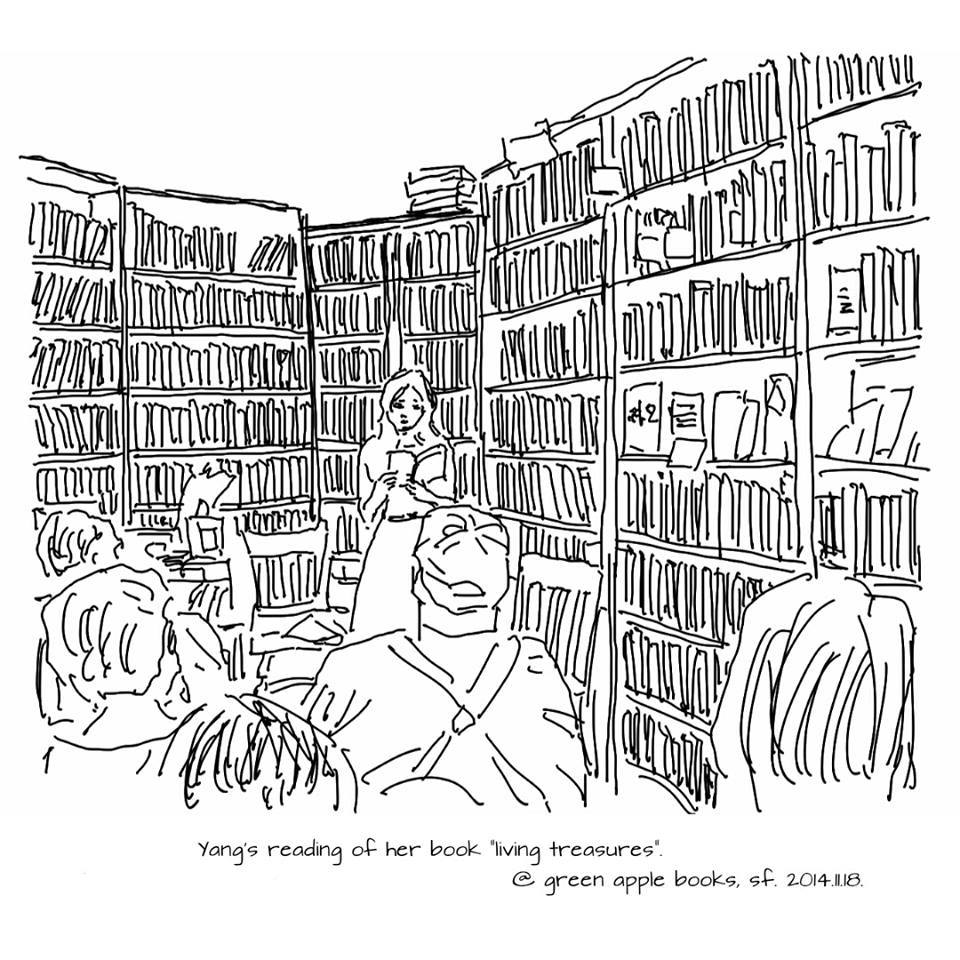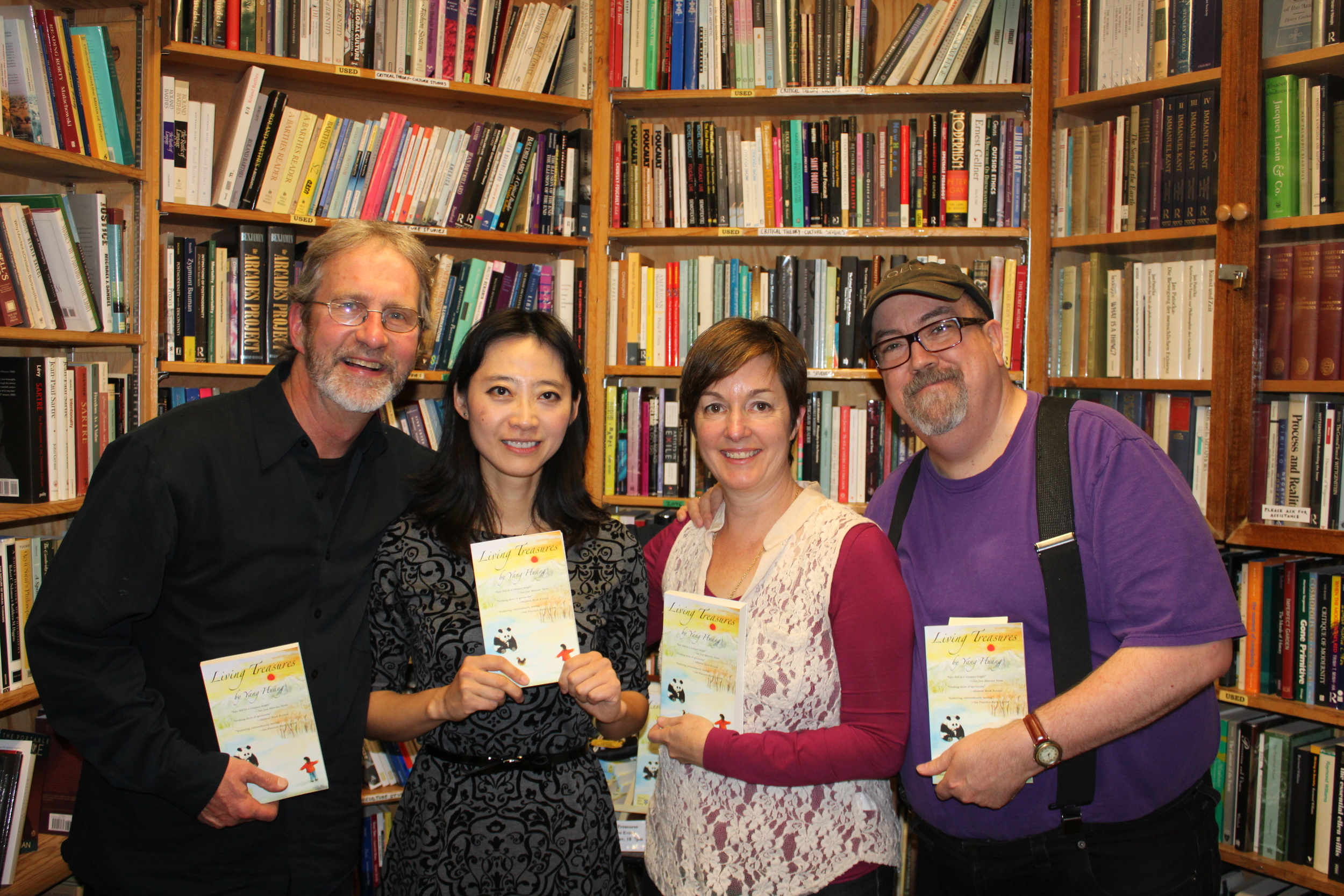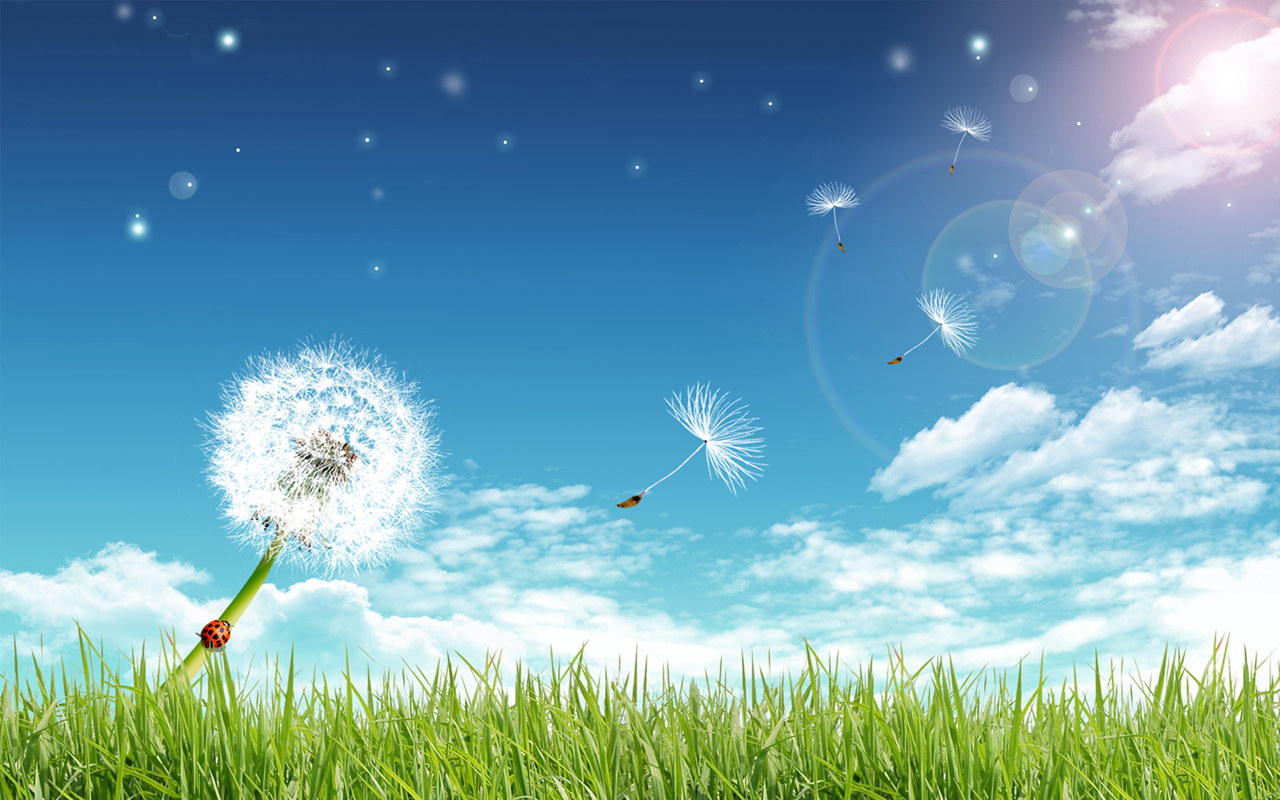各位来宾:你们好!
这是我的孩子们:9岁的张佳宏和11岁的张佳俊 。请和小朋友们拿张彩票,会后有小礼品赠送。这是一只可爱的熊猫陶瓷茶杯,看见它你会想多喝点饮料。这是一只绣花的帆布袋,轻便好拎,非常有用。这绣的是书的封面,熊猫,母鸡,和女孩在一起玩。读完书后,你会明白这里的含义。这个图案有8000针,比起我写书用的心血,是微不足道的。
我们都要感谢图书馆员卢慧芬,她做了很多工作,我非常佩服她的胆魄,智慧,和社会能力。你们可以从图书馆借《国宝》Living Treasures,办好图书证就可以了。会后你也可以向我买书,我会给你签名,感激读者们的支持。
Friends, thank you for coming out to see me today. Make sure you get a raffle ticket from my little helpers: 9-year-old Oliver and 11-year-old Victor. Here are the prizes: a porcelain panda mug, its cute print makes you want to drink more beverages. This is a recycled cotton bag, almost weightless but very useful. It has the embroidery of my book cover. The panda, chicken, and girl are playing together. After reading the novel, you’ll understand the symbolism. This embroidery has about 8000 stitches, a tiny fraction of the work I put into my book.
I want to thank Doris for inviting me. She worked tirelessly to publicize and organize this event. I am grateful for her hard work, resourcefulness, and generosity. You may borrow my novel: Living Treasures from the library. Here is the form, if you need to apply for a library card. You may buy a book after the event. I’ll autograph your book. As an author, I appreciate your support.
今天我的全家都来了,我妈妈坐在那里。 我的孩子们喜欢打棒球,也会弹吉他。他们的老师Hassan El-Tayyab 是乐队《美国游牧者》的主歌手。张佳宏和张佳俊学吉他有一年多了,很敬慕他们严格的老师。今天他们要为您唱一首歌 。
It’s a special event, because my family is here with me. I invited my mother. My boys love to play baseball and guitars. Thanks to their awesome teacher, Hassan El-Tayyab, over there. Hassan is the leading man in the band: American Nomad. Very cool band, you should check them out.
Here is a quote:
“Their original music is rooted in Americana and folk/swing traditions. American Nomad draws from the spirit of travel and authentic life experience.”
Inspired by their musician teacher, Oliver and Victor will sing a song: Take Me out to the Library.
我支付孩子们薪水,所以他们已经开始赚钱,比妈妈小时候能干多了。他们读过我的书《国宝》。张佳宏两个下午就读完了,还推荐给哥哥和他的老师。
我有正职,在柏克莱大学电机工程系做电脑工程师。我是一个乐观的作家,我写的故事通常是正能量的。我关心社会问题,乐于考验我的小说人物,让他们遭受挫折磨难,在痛苦中寻找出路,即使遭遇迫害,他们能够想方设法突破困境,凭借自己的勇气和智慧走向未来。
BTW. I paid for them to perform, so they are paid musicians, way ahead of their mother. They also read Living Treasures. It took Oliver two afternoons to finish it, so it’s a quick read.
I have a day job, working as a computer engineer at UC Berkeley. As a writer I have a rather optimistic worldview. I like to tackle big social problems in my fiction, put my characters under the test, let them suffer, and in their darkest and most despairing hours, let them use their ingenuity (much like an engineer), and find some sort of relief or solution, not a cure-all, but a way out, so that they can move forward to rebuild their lives.
我想先谈谈这本书的灵感是哪里来的。这里有几个构思点。
第一是熊猫,又叫猫熊。你说它是不是很可爱?可是你知道它的秘密吗?熊猫其实不是素食者。它是熊,会吃小鸟,老鼠,蛋和鱼。它99%吃竹子,因为动作缓慢,抓不住小动物。
Before I talk about my book, I want to tell you the inspirations for my story.
First, it was the panda. Who could resist a face like this? But do you know its secrets? Panda is bear, with the digestive system of a carnivore, thus derives little energy and protein from consuming bamboo, which is 99% of its diet. Pandas in the wild occasionally eat birds, mice, or fish if they can catch them.
To make up for the inefficient digestion, a panda needs to consume 20 to 40 pounds of bamboo every day. This affects its behavior. A panda must spend 10 to 16 hours a day foraging and eating. The rest of its time is spent mostly sleeping and resting.
竹子会周期性开花结籽,然后竹子会成片死亡。籽会成长为新的竹子,可是需要好几年,熊猫就会挨饿受冻。
我上中学时,曾经为拯救大熊猫募捐。我们贡献出自己的压岁钱,为可爱的熊猫祈福,讲述充满希望的故事,但愿它们能够渡过难关。
Bamboo species flower periodically, every 30 - 120 years or so. All plants in a particular species mass flower worldwide over a several-year period. Flowering produces seeds, and bamboos die after flowering. The seeds will give rise to a new generation of bamboos, but it can take years to replenish the food supply for pandas.
When I was in middle school, we donated money to rescue the pandas from starvation, as bamboos mass flowered over large areas of the Min Mountains. It was one of the few fund raising events I ever had in China. The plight of cuddly pandas touched many young hearts. We wrote letters, essays, drew pictures, and told stories about these national treasures.
熊猫在饥饿的时候会到村里去觅食。小说女主人公名字叫顾宝,和“国宝”同音。 熊猫妈妈当着顾宝的面吃了一只母鸡,然后给她的宝宝喂奶。这是小说的开始。
我的第二个构思点是89学运。
My book begins with a mother panda eating a chicken, so that she could survive the winter and nurse her cub.
Here we see the resilience of panda, and the girl who witnesses it.
My second inspiration is the student movement of 1989.
My heroine, Miss Gu Bao, her name sounding like “national treasure” in Chinese, grows up in the 80s.
1989年是思想开放自由的时期。经过文化大革命,许多西方的理性哲学在中国受到年轻人的欢迎。于是很自然的,人们开始要求民主和自由。这是我的先生当年意气风发的样子。我没有照片,因为学生害怕秋后算账,许多人是晚上出去游行的,还带着口罩。这应该是五月中旬,全国学潮受到社会的广泛支持。这时候拍的照片是爱国青年,不再是一小撮叛乱分子。
可是情况很快激化了。至今我们不知道多少人在六月四日遇难。官方说天安门广场上没有伤亡,并把学运从中国历史里完全抹去了。大陆的年轻人不知道1989年发生过什么事。我的同班同学参加过绝食,六四后便退学了,至今音信全无。刘晓波博士,诺贝尔和平奖得主,为失去孩子的天安门母亲们申诉,他至今在大陆坐牢。
It was a hopeful time, a liberal time. After the dark ages of brutal prosecution and censorship in the Cultural Revolution, many western thoughts were introduced and flourished in China. For the young people, it was sexy to be in a debate salon and wrangle over ideological issues. Before long, people began to demand human rights, freedom, and democracy.
This is Qin, my better half, during the heyday of the 1989 student movement. I didn’t have a picture, because people were still afraid of retaliation. Students began their protests at night, wearing facial masks to avoid being recognized or photographed. This might be mid-May, when the movement had gained so much support throughout China. It was “safe” to be seen as a “patriotic youth” rather than condemned as “a traitor conspiring to overthrow the government.”
Soon the situation escalated. The Tiananmen Square massacre came as a complete shock. To this day, we don’t know how many were killed on the dawn of June 4th. The official story was that no one died in the square. The propaganda machine in China wiped out every evidence of the demonstrations and subsequent crackdown. My poor parents were grateful that I wasn’t in the Square that night. They told me to never speak of it. What good does it do, for the dead and living? My classmate, a hunger striker, dropped out of the university afterwards. I never heard from him again. Dr. Liu Xiaobo, the Nobel Peace Prize Laureate, is still imprisoned for speaking up about the Tiananmen Square massacre.
89学运是我们这一代人生命中的重要时刻。学生的失败也是中国的失败。中国失去了一个历史契机,这是令人痛心的悲剧。可是我的小说不愿意停留在悲剧上,我想看到希望,所以我让女大学生顾宝爱上军人李铜。六四是她故事的起点,而不是终点。我不想让顾宝的故事停留在天安门广场上,她需要走出去,看见真正的中国。我让她去了四川农村。
我的第三个构思点是计划生育。
The student movement in 1989 was a defining moment of my generation. We experienced the hope, joy, and heartbreak of losing a historical opportunity. I reflected on the tragedy for more than twenty years. I would write a story about the students’ fight but with a more meaningful arc. There were many things leading up to the massacre and following after that, but that night, inevitably the focus of my story is just a starting point, a central metaphor for Bao’s tragedy. I didn’t want it to end on Tiananmen Square. It needed to be in rural China, where a lot of the injustice happened.
My third inspiration is the one-child policy.
[我想问一下] May I see a show of hands? It doesn’t matter where you were born. [在座多少人在家里不是老大(不是家里的第一个孩子)?请举手好吗?] Would those of you not firstborns please raise your hands? [That’s about a third of the people in this room.] [几乎1/3。假如你1976年后出生在中国,你的父母一定付出了代价,才能够让你来到这个世界。] You wouldn’t have been born in China after 1976, if your parents hadn’t fought hard to save your lives.
我们重温一下历史。上世纪50年代期间毛主席提倡生育,鼓励多生的“英雄妈妈”。中国人口从1949年的5.4亿增长到1979年9.7亿,30年里增长了80%。70年代末政府严格控制人口增长速度,除了少数民族外,一对夫妇只能有一个孩子。
中国计划生育的关键是缺乏有效监督。计生部门弹性执法违法执法已成常态,地方政府都有自己的一套规章制度。这些制度并没有被计生部门用来遵守而是被在方便的时候引用。有些地方计生队贪污罚款,强行堕胎引产结扎,绑架妇女及家属,逼迫交纳巨额罚金。
Here is a little bit of history. In the 1950s, Chairman Mao, with a typical peasant mentality, banned family planning and encouraged women to have as many children as possible. The population grew from 540 million in 1949 to 969 million in 1979, nearly 80% of population increase within three decades. In the seventies the government tried to solve the population crisis by enforcing strict controls to slow down the birth rate. Aside from some minority groups, every couple could only have one child.
The problem is: local governments all had their own rules and regulations to enforce the policy. Some people lost their jobs after having a second child. Others were fined. Like many policies in China, there was abuse of power and corruption was rampant. In some villages, one-child policy worker team hired thugs to threaten and beat up people, force collect the fines, and even kidnap the women and their relatives. Some women had their full-term babies aborted. (If the drugs couldn’t kill, a nurse injected medicine on the baby’s temple when the mother was pushing.) Some women died from the brutal procedures, while others were forced into sterilization.
我的第四个构思点是盲人律师陈光城。我在修改《国宝》的时候,听说陈光城,一位农村的维权人士。他年幼时失明,自学法律,成了“赤脚律师”,在山东农村从事保护妇女权利,土地权,和穷人的权利。这是我为顾宝选择的职业道路,她会成长为草根维权人士。
社会的公正和变革不是政府施舍给你的。你必须努力争取自己的自由和权利。天安门广场上的谈判不会带来深层的社会改革。只有你坚持不懈,勇于承担,帮助弱者,中国社会才能有人性化的长足进步。
My fourth inspiration is a blind lawyer, Mr. Chen Guangchen.
While revising Living Treasures, I learned about Mr. Chen, a civil rights activist who worked on human rights issues in rural China. Blind from an early age and self-taught in the law, Chen is a “barefoot lawyer” who advocates for women’s rights, land rights, and the welfare of the poor. That was the career path that I planned for Bao, that she would mature into a grassroots activist.
To make a real change, even a small one, you cannot expect it to be passed down from the government, but rather, it needs to start with you and your actions. The victory isn’t achieved by the talks on Tiananmen Square but in every action you do, every person you help, and every sacrifice you make for the common good.
89年的学生曾经热切期盼制度的改变。在我看来,草根的崛起是中国的希望。
不管政府怎么对待你,每一个中国人理应是自由的人,坚信自己的公民权利和社会责任,并向社区里的弱者伸出援助的手。
我的主人公顾宝能够以陈光城为榜样坚持维权运动。2005年,陈光城律师将临沂(yí)市计划生育工作队的野蛮侵权行为告上法庭。这是多么勇敢,令人敬佩的盲人律师!
The students in 1989 appealed to the ruling class to change the corrupt system. It ended in the massacre. That’s no reason to give up. What if we don’t fight, but live our lives to the fullest?
Every person thinks s/he is free, despite what the government tells them, and live their lives like free people, take charge of their social responsibilities, and reach out to the less fortunate.
I know Bao could do this, because Mr. Chen did it with some success. In 2005, Chen organized a landmark class action lawsuit against authorities in Shandong province, for the excessive enforcement of the one-child policy. What an amazing achievement for a courageous blind lawyer!
在我的小说《国宝》里,乡村妇女兰花已经有了一个女儿。计生队两次强行给她堕胎。她再次怀孕后,躲到山里,这时遇见了女大学生顾宝。顾宝曾经为了学业违心地堕了胎。她一开始看不起兰花,认为兰花是文盲,重男轻女。可是渐渐地,她对兰花的勇气生出敬佩。 最后的关键时刻,顾宝挺身而出, 勇敢地为兰花付出了自己最宝贵的东西。
顾宝遭遇的暴力,也是六四的暗喻。不同的是,顾宝在军人男友的帮助下,重新站立起来,成为草根维权人士。顾宝的维权之路一定是险象环生,布满荆棘,可是她做的艰苦危险的工作将会给中国社会带来持久的,本质的,和平的转变 。
在写作过程中我发现,熊猫是国宝,中国人也是国宝。每一个孩子都是国宝 。只有13亿人都成为国宝,中国的人权才会有保障。
In Living Treasures, village woman Mrs. Orchid already has a daughter. The one-child policy worker team forced her to have two abortions. When she gets pregnant again, she hides in a cave. There she meets Bao, who ended her pregnancy in order to continue her career as a law student. Bao is not impressed with Orchid at first, but she learns to admire Orchid’s strength and resolve to have her child. She ends up risking her own life to protect Orchid.
The ensuing violence is a metaphor for the Tiananmen Square massacre. But Bao is more fortunate than the students in the Square. With the help of her soldier boyfriend, she is able to rise from her tragedy and becomes a human rights activist. Her journey will not be easy, and she will suffer a great deal for her choice, but she has taken an important first step, not only for herself, but for 1.35 billion Chinese people who don’t have the political power.
你也许会问:为什么用英文写这本小说?出于几个原因。我在中学时,特别痴迷法国作家:雨果,巴尔扎克,和大仲马。在我看来,他们的异国故事比当时中国的文革伤痕小说更加生动,真实,令人向往。午休后,我强迫自己放下书,走去上学。这时候我已经看不见烈日下的拖拉机,牛车,摩托车,和自行车。我依稀觉得自己在法国大革命期间,在巴黎昏暗的小巷里疾走躲避警察追捕。多年后我用英语写中国的故事,搭起文化的桥梁,使我的梦想成真。我给我的大孩子取名Victor,与作家雨果同名。
用英文写的第二个原因是审查制度。我在大陆的新浪有博客,名为:黄洋的文字桥梁。我知道什么可以写,什么关键字马上会被删除。网络审查是可以用同音字绕过代替的,可是我们内心的胆怯呢?假如我们绕过所有敏感字和揭露社会弊端的故事,那还有什么值得写的呢?
You may ask why I wrote the story of a Chinese woman in English. There were several reasons. When I was a teenager, I was enthralled by the French writers, novels by Victor Hugo, Balzac, and Alexandre Dumas. Those stories from the faraway land seemed more realistic, vivid, and inspirational than the Chinese novels about the suffering in the Cultural Revolution. When I managed (believe me, it was hard) to put down the book and walked to the school, I no longer saw the tractors and oxcarts, motorcycles and bicycles in bright daylight but felt as if I were running down the dimly lit alleyways in Paris during the French Revolution.
Then I was able to rise above the peer pressure and self-consciousness, that I wasn’t pretty, intelligent, or popular at a prestigious high school. I was just a captivated reader. The story of French people translated into Chinese was devoid of clichés yet colored by passion. I grew up and named my first child Victor, after my idol Victor Hugo.
My 2nd reason was the censorship. My book would be banned, before it was even written in Chinese. I kept a blog in mainland China and learned many tricks to circumvent the internet censorship. Even worse is the self-censorship. A famous writer once said, “If you want to write honestly, you should write like an orphan.” I didn’t like being an orphan, so I’d say, “If you want to write honestly, write in a foreign language that your parents cannot understand.”
我是十九岁来到美国,二十一岁大学毕业,开始做电脑工程师的工作。两年后,我便有了中年危机,于是回到学校攻读文学和写作。这期间我一直全职上班,非常幸苦。我去读了英语硕士和创作硕士,也交了不少写作的朋友。其实写小说对很多人来说都是困难的。哪怕是母语,即使你很有才华,写小说迫使你与你的灵魂对话,与命运抗争,战胜自己的偏见与骄傲,把自己剥得片甲不留,只剩下一个柔软温暖的心灵,在绝境中柳暗花明,终于发现你的故事,才能感动你的读者。创作没有捷径可走。假如工作是谋生,是索取,写作对我来说是生活,是奉献。
用英文写作后,我发现一些习以为常的大陆官方语言其实是伪命题。比如说:中国人口众多,人民素质不高,民主要慢慢来,或者说,时候未到。其实这是一个鸡生蛋,蛋生鸡的问题。没有发言权,人民只好被管理,他们无法发挥自己的才能,只能去巴结领导。那么领导呢,就有了生杀大权,不再受到监督约束。这造成的官僚腐败,贫富悬殊的社会问题是我们有目共睹的。
我赞同马英九总统的观点:中国大陆现在经济发展快速,人民生活改善,此时此刻正是大陆走向民主宪政最适当的时机。民主与法治从来不是西方人的专利,而是全人类的权利。
改革初期邓小平有魄力“让一部分人先富起來”。我们海外华人为祖国的强大感到自豪。可是为什么政府怕“让一部分人先民主起來”?
I came to the U.S. at the age of nineteen, graduated from college at twenty-one, and became a computer engineer. At twenty-three, I had a midlife crisis. I went back to school, while working full time, and studied literature and writing. It was very hard work. From day one I knew I would support my writing life by working as an engineer. What got me through two decades of apprenticeship was not the prospect of being published, though it was nice that I finally got published, but the firm belief that I was doing something worthwhile. Having a job is to earn my keep from the society, but writing is to give back to the community my soul, my struggle, and my faith in humanity and future.
Here is my 3rd reason to write in English: to communicate with people different from me—to educate them, entertain them, and affirm the values that we all hold dear: truth, love, courage, and selflessness. In a small way I was emulating the masters: Victor Hugo, Balzac, and Alexandre Dumas. Likewise, I wanted to tell stories of the faraway land that make people forget the trouble in their own lives, just for an instant, look up and see a bigger world full of people, who look like strangers, as you look more closely, you’ll find they are just like you, with the same longings, fears, and ambitions. Their children and your children will inherit the same world after you are gone.
我是生了第一个孩子后,才动笔写《国宝》的。后来又生了第二个孩子。家里的事也越来越忙。我的第一责任是母亲。任何时候孩子们的需要是第一位的。所以我的书是写了停,停了再写。比起我写作初期的作品,要来得慢而且不连续,可是孩子们也给我更多的时间磨我的故事,一年年后,我的故事和我一起成长。从前的我是兔子,现在是乌龟。在爬行的路上看到了更多的景色,流了更多的汗水,让我的心灵和情感丰富起来。
养育孩子也给了我更多的社会责任感。以前我们认为民主是一场能够打赢的仗。现在我知道民主制度是一个初生的婴儿。她真的来到我们社会里,我们要好好地,耐心地,一年年地养育她,她才会茁壮成长,结婚生子,她会老化,有下一代。人类社会的生生不息,比任何理念的胜利更加重要更有意义。
我想到最近的台北市长竞选,一位医生一路战胜了民进党和国民党竞选人。这是民主社会成熟的标志。我很赞同柯文哲市长当选人的话:“从白衫军到太阳花学运,公民运动造就了台湾新政治的来临。公民社会的崛起不是否定政治,而是开拓公民参与的契机。”
我听了真的很嫉妒。要知道当年天安门事件后,大陆的人民很快地和党统一了观点,感慨地说:假如把中国交给学生治理,那还不是又来一次文革?
其实这根本是个伪命题。
文革是毛主席发起的,怎么可以把功劳归给学生?请问哪里的年轻人会向往穿没有性别的衣服,过没有爱情的日子,每天唱红歌,跳忠字舞?这显然是教育的结果。
89年学生也是社会造就的。他们的激进不完全来自胆量,更多的是害怕失败。因为:成者为王,败者为寇。
我们要记住:民主是有代价的。只有经历过很多挫折失败,我们才能学会协商,合作,妥协。每一次我们来到历史的十字路口,我们是一起走来的,我们是一个团队。我的成功,不一定要建立在对方失败的基础上,而我的失败则可能是走向成功的第一步。
I got a lot of friendly advice over the years. They told me: You’re the first generation immigrant, and you’re a woman. You have to work and raise a family. You don’t have the luxury of chasing a dream. Wait until you are retired, your children in college, and then take your time to write. I didn’t take the sensible advice. Life is short. I’d rather multitask and fail, than wait and discover that my time has run out. If my life were a baseball game, I want to strike out swinging rather than strike out looking.
I never argued with the wise people who warned me that I might fell. I had nothing to prove. Just do it.
Writing is a lonely task. I found support in friends and my family. Just do it.
It didn’t matter if I failed or succeeded. I am only limited by my timidity, my prejudice, and my own imagination.
I told myself: Just do it. Keep doing it. And do more of it. Predictably, the wise people left me alone.
I got a BA, an MA in English and an MFA in Creative Writing. My life got more hectic after I graduated, but I kept on writing. I had children, and they slowed me down. I used to write a book in a year and half, but Living Treasures took me five years to write and five more years to get it published. If I were a hare before, now I am a turtle. I plug away patiently and take in beautiful sceneries on my journey. As I grow older, I have less time to write. I focus on the essentials, the emotions, and no longer cringe to cut my favorite passages in order to advance the story.
顾宝教给了我许多人生的道理。在多次的修改过程中,她慢慢失去了激进的政治观点,而是更加注重人权和独立性的培养。她意识到原来18年的成长过程中,她只是一个傀儡,听从父母,学校,领导,从来没有独立思考过自己的未来和权利。她堕胎后,来到乡下和外公学习养蜂,开始培养基本的生活能力。这时候,她的独立性慢慢滋长,意识到,她的行为是有后果,有力量的,她能够用自己微薄的力量保护弱者。她的成长也使作者我走出25年前绝望的心境。在任何一个社会里,每一个人的力量都是有效果的。小说可以写出生活里看不到的希望。
我们也有追求信仰的勇气吗?等到有一天,我们不再害怕失败,放下重重顾虑,才能在心底深处,发现自己的豪胆英雄。他会鼓起你的勇气,让你寻找帮助,开创梦想和未来。人生不是给我们挥霍,而是要珍惜的。只有不怕失败,我们才能够摈弃锁链,超越渺小的自我,拥挤的社会,和不公平的世界。当勇气给我们带来智慧,每一个人能够找到他的自由境界。
I learned much from watching my heroine develop and mature in the course of a novel. A young woman who wants to become a lawyer, Bao has so much to lose at the beginning: her virginity, her baby, and her career. When she’s confronted with evil, her conscience wakens. She takes a stand for what she believes in and risks everything in her life.
Do we have the courage to fight for our true believes? If we look deep inside, we’ll find a hero or heroine buried under the layers of politeness, the mundane, and the compromises. If we are true to ourselves, that hero or heroine will awaken, summon their courage, elicit help, and open doors to new careers, new relationships, and creativities. Life is not merely a thing to be tolerated but celebrated. We become free even as we are trapped inside this transient shell, this small building, and this unjust world.
Thank you.
谢谢。假如你有兴趣,我可以读一段英文故事。
If you like, I’ll read a scene from my book.













